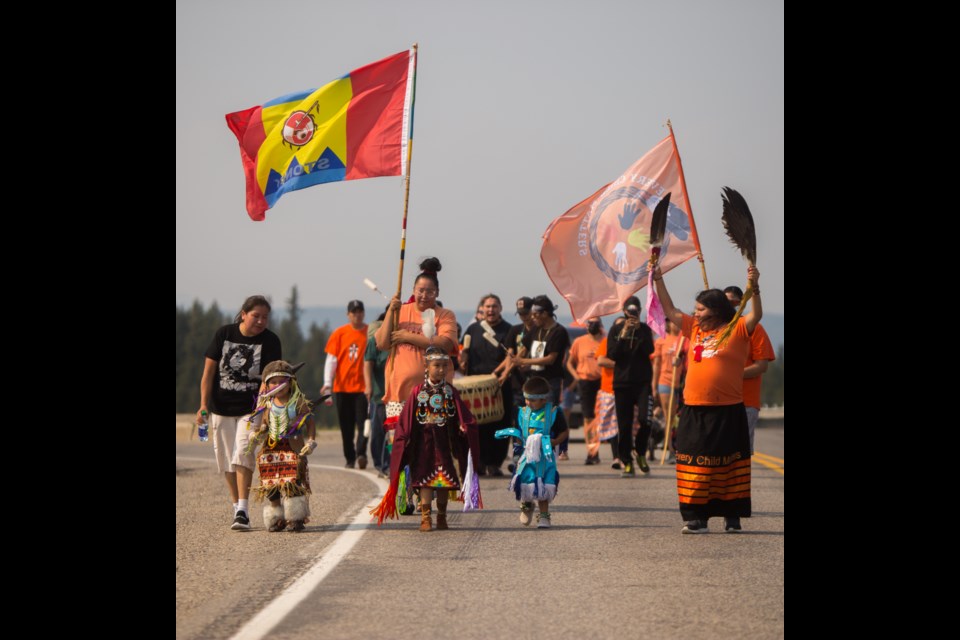STONEY NAKODA— Walking more than 1,500 km in honour of survivors of Residential Schools, a member of the Kahkewistahaw First Nation, Sask. stopped off in Stoney Nakoda First Nation Tuesday (July 27).
Shayna Taypotat, 29, began her gruelling journey on June 23. She was inspired to walk from her home Nation in Saskatchewan to British Columbia after the discovery of 215 children buried in unmarked graves at the former Kamloops Residential School. She has been averaging between 40 km to 45 km each day.
“It’s been healing,” Taypotat said. “I’m not only healing myself, but I’m healing all, including the non-Indigenous.”
When the children's bodies were discovered in Kamloops, Taypotat said, she was shocked and deeply saddened.
“I couldn’t get out of beds for days. I was crying all day,” Taypotat said. “I’m a mom and my daughter is eight. I couldn’t imagine sending her when she is four, the policemen coming and forcing me to give her up to go to these schools. It’s a nightmare— In the core of my soul it hurts.”
Taypotat said she hopes her walk serves as an opportunity to encourage healing and awareness surrounding the plight of Residential Schools.
It was incredible being greeted by Stoney Nakoda First Nation members and having the opportunity to share important stories and experiences from Residential Schools, she said.
Stoney Nakoda elder Koko Powderface said it was a powerful and emotional experience greeting Taypotat when she arrived at the Stoney Nakoda Resort and Casino.
Powderface helped organize and spur the delegation to greet Taypotat when she arrived in the First Nation.
“It triggered a lot of pain, but at the same time representing my ancestors and the inter-generational traumas that we’ve experienced and how we’ve come to be so resilient [was powerful] ... We’ve been silent for so many years," Powderface said. “It’s time that the pipeline of First Nations is joining forces to take a look around and a deep breath and knows exactly what happened— Let the truth come out.”
The event welcoming Taypotat to Stoney Nakoda spoke to the truth, dignity and resiliency of First Nations across Canada, she said.
During the ceremonial greeting Taypotat, Powderface was moved to tears hearing the stories of Residential School survivors and those who have been affected by intergenerational trauma.
She hopes these conversations mark the start of the healing process and the growing awareness and acknowledgement from Canadians regarding Residential School traumas.
She added the stories shared at the delegation spoke to a larger story of First Nations, including the violence Indigenous women and men continue to face in Canada.
“We have the right to say no more,” Powderface said. “The people have been standing there and wanting to be asked— These are stories that have been waiting.”
The pain inflicted by Residential Schools has created inter-generational trauma and it has been an active choice to focus on healing and breaking cycles of violence, Taypotat said.
One of the keener ways she has felt the effects of Residential Schools is she does not know much about her culture.
“I don’t know my language or my practices, but I’m learning,” Taypotat said.
Her father, who died in 2003, was a Residential School survivor. Taypotat said he never spoke about his time in the school, but she could see how sick the experience left him.
“Emotionally this is hard,” Taypotat said, adding this is especially challenging during conversations she has with people along the way.
However, these difficult chats inspired her to be strong and carry on with her healing journey.
Taypotat is travelling with her brother Greg Taypotat who follows her from his truck to ensure she stays safe on the highway. The walk has brought the siblings together closer and they have united in helping heal the traumas infliced by Residential Schools.
Taypotat said she has been amazed at the support she has received during her walk. She has people from all around the world including South Africa and China send messages encouraging her on her journey.
When she arrives in Kamloops Taypotat plans on visiting the former Residential School and praying for the children and those affected by Residential Schools.
Although she has more than 800km left on her journey, Taypotat is already planning a second walk spanning from the Pacific to the Atlantic coasts in Canada. She will begin the walk when her nation completes ground-penetrating radar searches for possible unmarked graves.
Wesley First Nation Councillor Krista Hunter was on hand to greet Taypotat when she arrived in Stoney Nakoda.
“It’s about coming out as First Nations across Canada,” Hunter said. “Today what we did was all based on healing and conversations.”
Residential Schools forever changed Stoney Nakoda First Nation, Hunter said, forcing a peaceful society to face true evil.
“Now with Residential School, we know all forms of different evil."
It is challenging for Nation members because while they continue to heal from the impacts and trauma of Residential Schools, they also face racism from mainstream society.
Hunter said can see these impacts today firsthand with the addiction, languishing mental health and incarceration crisis First Nations face.
The Federal Government has taken steps to acknowledge the lasting damage of the Residential School system, she said, but she wants to see further action taken.
She hopes these experiences and impacts are recognized in schools, so Canadians can better understand and respect the experience of First Nations in the country. Restorative justice is also critical as it can help embrace cultural traditions while encouraging healing rather than punishment.
“Justice, education and mainstream society need to really understand what really happened to us,” Hunter said.
For those effected by the recent discovery of unmarked graves at former Residential Schools the National Indian Residential School Crisis Line is available 24/7 at 1-866-925-4419.
Read more from CochraneToday.ca



